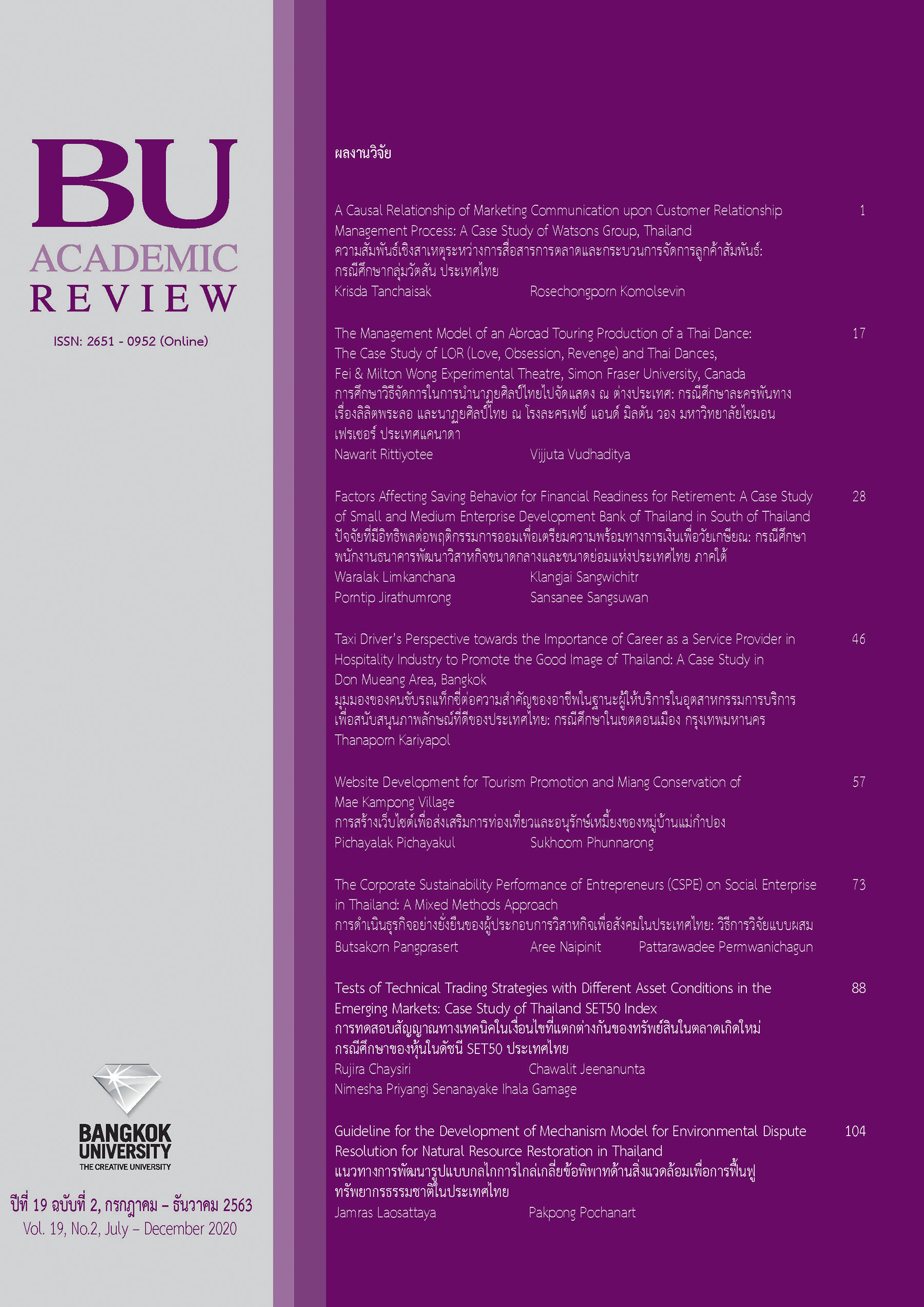Moral Panics and COVID-19: Are We Panic Ourselves or Do Media Make Us Panic?
Main Article Content
Abstract
People’s new normal has begun, i.e. how panic people are during the current period of emerging infectious disease COVID-19 outbreak. According to a moral panic theory developed and created by Stanley Cohen, there are several stakeholders putting people in struggle. Also, one of them who is really powerful and influential is communication and media people. It was, therefore, curious of whether or not media persons create people’s moral panics about COVID-19 and how media persons make people panic about COVID-19. Printed newspaper headlines were selected and analysed by collecting them from IQNewsClip online database available between 12 January and 10 March 2020 on Bangkok University online database. There were 2,213 cases that met the requirements. However, 1,704 cases or 77.00 per cent passed the test of intercoder reliability. The results of the findings revealed that it was media persons who created moral panics about COVID-19 among the publics. They had presented ways of calling the outbreak, confirmed cases and death and negative effects of COVID-19 on diverse circumstances. Altogether with this, writing style through the uses of words, sentence arrangement, and marks created more moral panics. This study contributes for media persons to rethink and reconsider their roles and responsibilities and also for people to reconsider perceived information and facts and not to be susceptible to media reports.
Article Details
The manuscript submitted for publication must be the original version, submitted only to this particular journal with no prior acceptance for publication elsewhere in other academic journals. The manuscript must also not violate the copyright issue by means of plagiarism.
References
Ahmed, W., Bath, P. A., Sbaffi, L., & Demartini, G. (2018). Moral panic through the lens of twitter: An
analysis of infectious disease outbreaks. Retrieved June 3, 2020, from
https://core.ac.uk/download/pdf/327370919.pdf
Anonymous. (2020). The world gets ready Covid-19 is now in 50 countries and things will get worse. February 29, 2020. Retrieved March 3, 2020, from https://www.economist.com/briefing/2020/02/29/covid-19-is-now-in-50-countries-and-things-will-get-worse
Aslam, M., Awan, T. M., Syed, J. H., & Kashif, A. (2020). Sentiments and emotions evoked by news headlines of coronavirus disease (COVID-19) outbreak. Humanities and Social Sciences Communications, 7(23), 1-9. doi: https://doi.org/10.1057/s41599-020-0523-3
Bonn, S. A. (2015). Moral panic: Who benefits from public fear? Retrieved March 5, 2020, from
https://www.psychologytoday.com/us/blog/wicked-deeds/201507/moral-panic-who- benefits-public-fear
Centers for Disease Control and Prevention (2020). If your pet tests positive. Retrieved November 20, 2020, from https://www.cdc.gov/coronavirus/2019-ncov/daily-life-coping/positive-pet.html#:~:text=A%20small%20number%20of%20pets,taken%20care%20of%20at%20home.
Department of Disease Control, Ministry of Public Health. (2020). COVID-19. Retrieved March 5,
, from https://ddc.moph.go.th/viralpneumonia/index.php
Falkof, N. (2018). On moral panic: Some directions for further development. Critical Sociology,
(2), 225-239. doi: https://doi.org/10.1177/0896920518803698
Gilman, S. L. (2010). Moral panic and pandemics. The Lancet, 375(9729), 1866-1867. doi:
https://doi.org/10.1016/S0140-6736(10)60862-8
Glen, S. (n.d.). Inter-rater reliability IRR: Definition, calculation. Retrieved July 14, 2020, from
https://www.statisticshowto.com/inter-rater-reliability/
Jasper, J. M. (2001). Moral panics. International Encyclopedia of the Social & Behavioral Sciences,
, 10029-10033. doi: https://doi.org/10.1016/B0-08-043076-7/04357-6
Kazuhiro, N. (2020). Coronavirus outbreak puts Japan’s health literacy to test. Retrieved May 26,
, from https://www.nippon.com/en/in-depth/d00551/
Ketchell, M. (2020). Coronavirus: How media coverage of epidemics often stokes fear and panic. Retrieved September 24, 2020, from https://theconversation.com/coronavirus-how-media-coverage-of-epidemics-often-stokes-fear-and-panic-131844
Luce, A. (2013). Moral panics: Reconsidering journalism’s responsibilities. Retrieved March 3, 2020,
from http://eprints.bournemouth.ac.uk/21051/1/JNC-2013-Chapter-24-Luce.pdf
Lufkin, B. (2020). Coronavirus: The psychology of panic buying. Retrieved March 9, 2020, from
https://www.bbc.com/worklife/article/20200304-coronavirus-covid-19-update-why-people- are-stockpiling
Muzzatti, S. (2005). Bits of falling sky and global pandemics: Moral panic and severe acute
respiratory syndrome (SARS). Illness, Crisis & Loss, 13(2), 117-128.
Nicolson, D. (2020). The coronavirus (COVID-19) outbreak is an exceptional public health
emergency, but we can still learn from the experience of previous epidemics. Retrieved
Nicomedes, C. J. C., & Avila, R. M. A. (2020). An analysis on the panic during COVID-19 pandemic through an online form. Journal of Affective Disorders, 1(276), 14-22. doi: 10.1016/j.jad.2020.06.046
Nutbeam, D. (2000). Health literacy as a public health goal: A challenge for contemporary health
education and communication strategies in the 21st century. Health Promotion International, 15(3), 259-267. https://doi.org/10.1093/heapro/15.3.259
Peckham, R. (2020). Why the world health organisation is calling coronavirus an “infodemic”.
Retrieved June 5, 2020, from https://www.prospectmagazine.co.uk/science-and-technology/coronavirus-panic-global-crisis-in-trust-pandemic-conspiracy-misinformation-science
Pennycook, G., McPhetres, J., Zhang, Y., Lu, J. G., & Rand, D. G. (2020). Fighting COVID-19 misinformation on social media: Experimental evidence for a scalable accuracy-nudge intervention. Psychological Science, 31(7), 770-780. https://doi.org/10.1177/0956797620939054
Regester, M., & Larkin, J. (2008). Risk issues and crisis management in public relations: A casebook
of best practice (4th ed.). London: Kogan Page.
Worldometer. (2020). COVID-19 Coronavirus pandemic. Retrieved October 29, 2020, from https://www.worldometers.info/coronavirus/?utm_campaign=homeAdvegas1?
Zarocostas, J. (2020). How to fight an infodemic. The Lancet, 395(10225), 676. doi:


